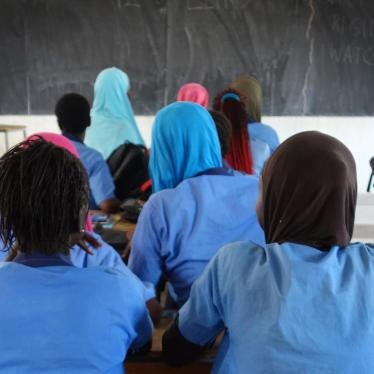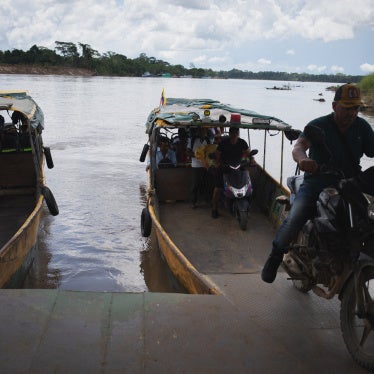Ministers of Justice and Attorneys General
African Union Member States
Dear Justice Ministers and Attorneys General,
We, the undersigned African civil society organizations and international organizations with a presence in Africa, write in regard to your May 15-16, 2014 meeting in Addis Ababa and its anticipated consideration of the Draft Protocol on Amendments to the Protocol on the Statute of the African Court on Justice and Human Rights (African Court).
As you know, the draft protocol proposes an expansion of the African Court to include criminal jurisdiction over genocide, war crimes, and crimes against humanity. We further understand that the draft protocol is now expected to provide immunity for sitting heads of state and other high-level government officials before the African Court.
We are writing this letter because we are gravely alarmed by the provision of any immunity for serious crimes committed in violation of international law, and for the reasons we explain below, we respectfully ask your government to oppose such immunity in this draft protocol.
The African Union’s (AU) Constitutive Act represents a significant declaration of the union’s unequivocal rejection of impunity, and commitment of the AU to intervene in a member state with respect to genocide, war crimes and crimes against humanity, as provided under articles 4 (o) and (h).
Immunity for sitting heads of state and other high-level officials for serious crimes would represent a major retreat from these objectives and be inconsistent with the spirit of the AU Constitutive Act.
The irrelevance of official capacity is at the core of making accountability for the gravest crimes meaningful. The alternative would carve out a sphere of impunity for high-level perpetrators, and create an incentive for such perpetrators to hold on to power indefinitely. Such impunity is further inconsistent with the needs of victims and ensuring justice for the gravest crimes.
International conventions, including the Convention against Torture, the Convention on the Prevention and Punishment of the Crime of Genocide, and the Geneva Conventions of 1949 recognize the imperative of accountability for individuals who have committed serious crimes irrespective of their position.
The irrelevance of official capacity before international criminal courts also has become entrenched in international law. The principle dates back to the post-World War II trials before the International Military Tribunal at Nuremberg and is included in the statutes of international and hybrid international-national tribunals, including the International Criminal Court (ICC), the International Criminal Tribunal for the former Yugoslavia (ICTY), the International Criminal Tribunal for Rwanda (ICTR), and the Special Court for Sierra Leone.
Immunity with respect to serious crimes is also barred before some domestic courts. For example, Kenya’s constitution provides that the “immunity of the President…shall not extend to a crime for which the President may be prosecuted under any treaty to which Kenya is party and which prohibits such immunity.” South Africa’s International Criminal Court implementing law provides that “the fact that a person…is or was a head of State or government….is neither…a defence to a crime; nor…a ground for any possible reduction of sentence.”
While other states allow immunity from prosecution domestically, a key purpose of courts that have authority beyond national borders is to enable cases that are not possible before national courts.
Broader issues regarding expansion of the African Court, discussed in a 2012 group letter, remain. In particular, trying individuals for serious crimes is distinct from the African Court’s present work and will place unique burdens and expenses on the court, such as the need for systems of witness protection, evidence collection, and detention of accused. At the same time, resources to support the court’s current human rights mandate and the development of Africa’s human rights system remain vital. In addition, national courts remain the first line of defense for justice and need attention from the AU to strengthen their capacity in AU member states, while the ICC remains crucial to efforts to ending impunity and merits support.
We appreciate your consideration of this letter, and would welcome the chance to discuss these issues with you or representatives of your government in greater depth. We may be reached through Stella Ndirangu, Program Manager at the Kenyan Section of the International Commission of Jurists at stella.ndirangu@icj-kenya.org, or +254 20 2084836/8.
Sincerely,
Amnesty International, Benin
Burundi Coalition on the International Criminal Court, Burundi
Action des Chrétiens Activistes des Droits de l'Homme à Shabunda, Democratic Republic of Congo
Ligue pour la Paix, les Droits de l'Homme et la Justice, Democratic Republic of Congo
Parliamentarians for Global Action, Democratic Republic of Congo
Synergie des ONGs Congolaise pour le Lutte contre les Violences Sexuelles, Democratic Republic of Congo
Synergie des ONGs Congolaises pour les Victimes, Democratic Republic of Congo
Voix des Sans Voix pour les Droits de l'Homme, Democratic Republic of Congo
Amnesty International, Ghana
Media Foundation for West Africa, Ghana
Amnesty International, Kenya
International Commission of Jurists, Kenya
Kenya Human Rights Commission, Kenya
Kenyans for Peace with Truth and Justice, Kenya
Transformation Resource Centre, Lesotho
Rights and Rice Foundation, Liberia
Civil Liberties Committee, Malawi
Center for Human Rights and Rehabilitation, Malawi
NamRights, Namibia
Civil Resource and Development Documentation Center, Nigeria
Coalition of Eastern NGOs, Nigeria
Gender and Constitution Reform Network, Nigeria
National Coalition on Affirmative Action, Nigeria
Nigerian Coalition on the International Criminal Court, Nigeria
Women Advocates' Research and Documentation Center, Nigeria
West African Bar Association, Nigeria
Amnesty International, Senegal
La Rencontre Africaine pour la Défense des Droits de l'Homme, Senegal
TrustAfrica, Senegal
Amnesty International, Sierra Leone
Centre for Accountability and Rule of Law, Sierra Leone
Coalition for Justice and Accountability, Sierra Leone
International Crime in Africa Programme, Institute for Security Studies, South Africa
Children’s Education Society, Tanzania
Amnesty International, Togo
Human Rights Network, Uganda
Women’s Initiative for Gender Justice, Uganda
Uganda Coalition on the International Criminal Court, Uganda
Southern African Centre for the Constructive Resolution of Disputes, Zambia
Coalition for the International Criminal Court, with offices in Benin and the Democratic Republic of the Congo
International Federation for Human Rights, with offices in Côte d’Ivoire, Guinea, Kenya, and Mali
Human Rights Watch, with offices in the Democratic Republic of Congo, Kenya, Rwanda, and South Africa
The signatories are among the most active members of an informal network of African civil society organizationsand international organizations with a presence in Africa who have been working on Africa and the International Criminal Court.
Updated May 6, 2014 to reflect additional signatures







